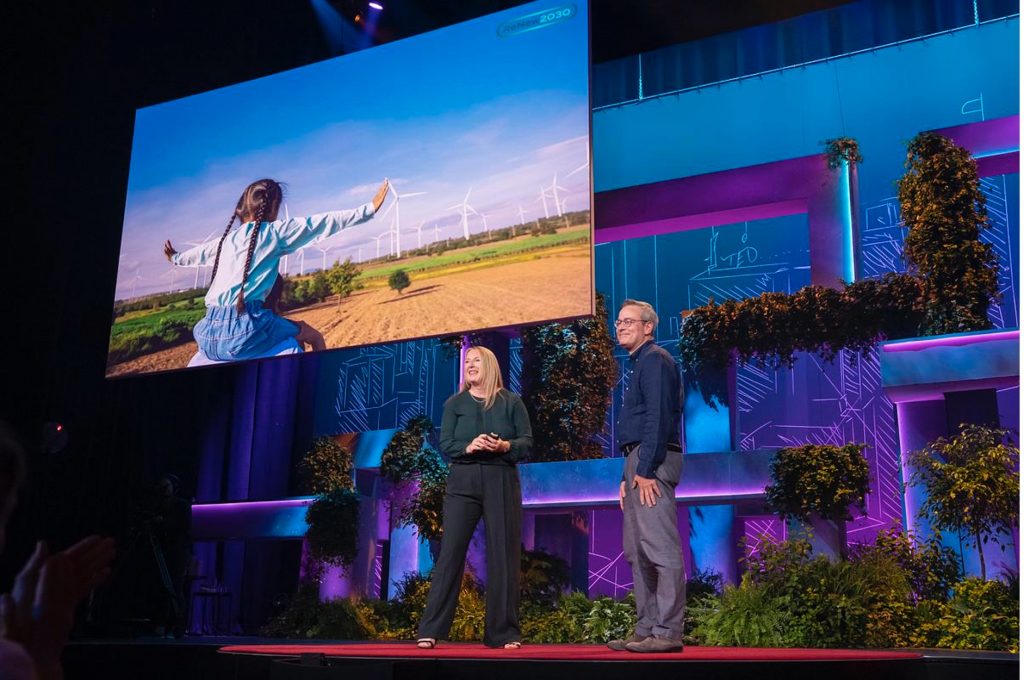By Shana Silver, Senior Philanthrophy Associate, Crux Alliance
ReNew2030, launched at the TED Countdown Summit, is an ambitious new philanthropy collaboration aimed at increasing global wind and solar capacity five times by 2050—a critical milestone for the power sector. Deploying renewables at speed and scale allows for the acceleration of electricity generation, transport electrification, and heat production for industry and buildings, and is necessary for keeping global temperature rise below 1.5 degrees Celsius. Agora Energiewende, an organization dedicated to designing smart clean energy policy worldwide and a member of the Crux Alliance, will help lead the charge to turn ReNew2030’s bold vision into a reality.
Most national and multinational targets and plans lack ambition and detail and omit considerations of equity and justice. These deficiencies are a key barrier to the expansion of wind and solar targeted by ReNew2030. At the heart of a successful increase in wind and solar is good policy.
The International Network of Energy Transition Think Tanks (INETTT), led by Crux Policy Center Agora Energiewende, is well placed to help drive power sector policy design and implementation. With 17 international partners dedicated to supporting the energy transition throughout Europe and the Global South, the INETTT network has deep roots and trusted relationships in multiple countries to support nationally based and locally specific policy solutions.
INETTT partners work to advance the highest-impact policies, including zero-carbon power sector pathways to enable a just transition away from fossil fuels using wind and solar technologies, renewable energy targets and standards, grid upgrades to manage renewables, and market incentives to improve flexibility and demand management.
ReNew2030 is an awardee of the 2023 Audacious Project, alongside other world-changing projects including Canopy, Global Fishing Watch, and Upstream USA. TED Countdown recently convened global climate leaders, policymakers, innovators, and activists for a summit in Detroit, Michigan, to explore how to design a better future for people and planet. ReNew2030 is led by Crux Senior Advisor Rebecca Collyer, who took the stage to launch the initiative at the summit.

ReNew2030’s approach to the renewables revolution
The next seven years are critical to phasing out fossil fuels and putting the world on course to net-zero emissions. Limiting global warming to 1.5°C requires cutting greenhouse gas emissions by almost half in that period. The electricity system is the biggest contributor to planet-heating emissions. Since more than half of the emissions reductions needed by 2030 must come from the power sector, transitioning from fossil fuels to renewables is the single most important thing we can do before 2030 to slow climate change.
Rapidly scaling up just two technologies—wind and solar—could deliver more than a third of the overall emissions reductions necessary by 2030. However, major barriers impede the urgent scale-up of renewable energy globally, including:
- Insufficient government ambition and policy: National and multilateral targets and plans are not ambitious enough, lack detail, and omit considerations of equity and justice.
- Inadequate investment: To stay below 1.5°C, clean energy investments must reach trillions annually by 2030, and markets will only get us part of the way there.
- Slow public acceptance and permitting: Permitting delays are slowing the transition, and insufficient consultation with communities creates public opposition and project lags.
- Misinformation about renewable energy: Cutting-edge information about renewables is not accessible and widespread, while damaging myths about cost and reliability remain pervasive.
- Subscale support for the workforce transition: Training for workers in the renewable energy space is critically needed, alongside re-skilling for those working in coal and gas industries.
While the EU and U.S. have passed landmark packages to scale renewable energy—RePowerEU and the Inflation Reduction Act, respectfully—the rest of the world has seen inconsistent progress. In response, ReNew2030 focuses on creating the conditions that will enable rapid scaling of wind and solar power and a just and equitable transition. The initiative will use seven levers to accelerate adoption at the national and transnational levels:
- Government policy, advocacy, and research: Combining technical assistance for governments with advocacy to push for more ambitious government commitments.
- Strategic litigation: Filing lawsuits to change policy, including to remove legal barriers for renewables and to delay or stop coal and gas projects.
- Strategic diplomacy: Engaging political leaders through diplomatic channels, coalition building, embassy engagement, and other forms of international cooperation to influence government-to-government action.
- Financial system mobilization: Advocating for innovative climate finance policies while pushing financial institutions and regulators away from fossil investments and toward renewables.
- Corporate sector mobilization: Urging corporate leaders to demand clean energy by engaging them through trade associations, business forums, and corporate lobbying, and providing analysis and technical assistance to help them set and achieve clean energy goals.
- Grassroots organizing and campaigns: Mobilizing local communities and people-powered movements, equipping them with the key arguments that help them create pressure to shift to clean energy.
- Strategic narrative: Raising public awareness of and support for renewables through investigative journalism, opinion articles, and digital campaigns, creating a drumbeat of stories on the clean energy transition.
Since the power sector provides a critical resource to society, factors such as consumer prices, jobs, balance of trade, and industrial strategy often drive electricity policy. But well-designed policy can ensure clean energy deployment benefits consumers and the economy. Agora and the INETTT network will help policymakers advance clean power policies that also lower costs, create jobs, and enhance global competitiveness.
The benefits of a just energy transition
Working to accelerate clean energy is not enough. We also must phase out fossil fuels. As much as 118,292 megawatts of new coal power capacity was built in 2022, and fossil fuel infrastructure continues to receive government subsidies of $1 trillion globally. At the same time, millions of people still depend on the fossil industry for their livelihood. For this reason, Agora and the INETTT network will also work with policymakers to both develop a clear path away from fossil fuels and toward wind and solar and to enact policies that guarantee a just transition from coal to clean for workers and impacted communities.
Communities across the world will benefit from a cleaner power system. Greater wind and solar power can provide more affordable electricity, a growth in green jobs, strengthen energy security, and ensure cleaner air. Creating a fast and just energy transition is for and about people and communities. The renewable energy produced as a result of ReNew2030’s work will sustain homes, schools, and hospitals, allow biodiverse ecosystems to grow, enable robust economic growth and, most importantly, help humanity and the planet thrive.
Coming up, two TED talks associated with ReNew2030 will go live on the 18th and 19th of September on TED.com. Meanwhile, hiring is underway for a Director and grants will start to flow in 2024.

